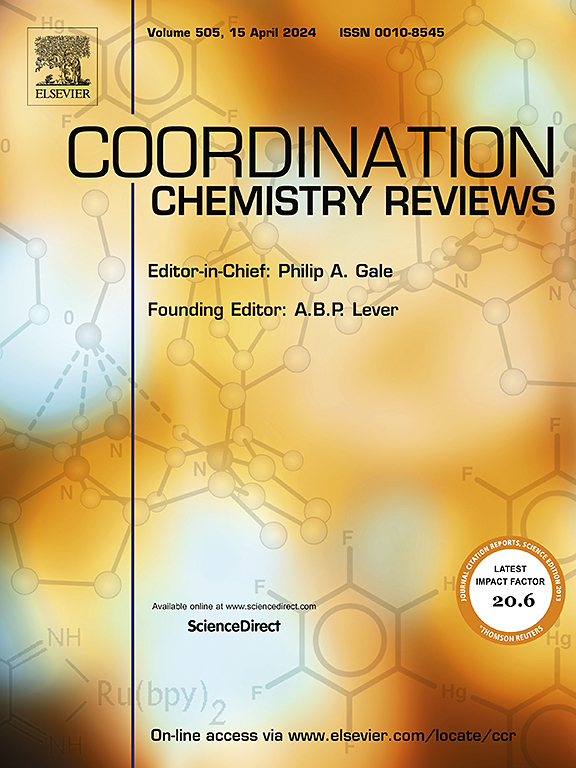Selective oxygen reduction reaction pathway for carbon-based catalysts
IF 23.5
1区 化学
Q1 CHEMISTRY, INORGANIC & NUCLEAR
引用次数: 0
Abstract
The oxygen reduction reaction (ORR) is crucial for cutting-edge energy conversion and storage systems. The selectivity of reaction pathways greatly impacts catalytic performance and determines the use of catalysts in these technologies. In this review, we summarize the research advancements on the selectivity of reaction pathways based on theoretical principles, clarifying the fundamental mechanisms of the 4e− and 2e− pathways, and elaborating their potential applications across various fields—bridging the existing gap of inadequate systematic connections between theoretical principles and practical applications. Subsequently, the design strategies for optimizing carbon-based electrocatalysts by tuning the central metal, coordination environment, and reaction microenvironment are discussed, along with the influence of different tuning methods. Meanwhile, the levering effect of heteroatom doping on the reaction pathways in metal-free carbon-based catalysts is also described, following which the environmental factors in the selectivity is emphasized. Finally, this review represents the challenges of existing research for ORR, and proposes future research directions, including establishing more accurate structure performance relationship models, exploring the potential of new coordination environments, and studying the influence of reaction kinetics on the ORR pathway selection. This work provides useful insights into advanced carbon-based electrocatalysis with designated ORR pathway.碳基催化剂的选择性氧还原反应途径
氧还原反应(ORR)对于尖端的能量转换和存储系统至关重要。反应途径的选择性极大地影响了催化性能,并决定了催化剂在这些技术中的使用。本文综述了基于理论原理的反应途径选择性的研究进展,阐明了4e -和2e -途径的基本机制,并阐述了它们在各个领域的潜在应用,弥补了理论原理与实际应用之间缺乏系统联系的空白。随后,讨论了通过调节中心金属、配位环境和反应微环境来优化碳基电催化剂的设计策略,以及不同调节方法的影响。同时,介绍了杂原子掺杂对无金属碳基催化剂反应途径的杠杆作用,着重讨论了环境因素对催化剂选择性的影响。最后,综述了现有ORR研究面临的挑战,并提出了未来的研究方向,包括建立更精确的结构性能关系模型,探索新的配位环境的潜力,以及研究反应动力学对ORR途径选择的影响。这项工作为具有指定ORR通路的先进碳基电催化提供了有用的见解。
本文章由计算机程序翻译,如有差异,请以英文原文为准。
求助全文
约1分钟内获得全文
求助全文
来源期刊

Coordination Chemistry Reviews
化学-无机化学与核化学
CiteScore
34.30
自引率
5.30%
发文量
457
审稿时长
54 days
期刊介绍:
Coordination Chemistry Reviews offers rapid publication of review articles on current and significant topics in coordination chemistry, encompassing organometallic, supramolecular, theoretical, and bioinorganic chemistry. It also covers catalysis, materials chemistry, and metal-organic frameworks from a coordination chemistry perspective. Reviews summarize recent developments or discuss specific techniques, welcoming contributions from both established and emerging researchers.
The journal releases special issues on timely subjects, including those featuring contributions from specific regions or conferences. Occasional full-length book articles are also featured. Additionally, special volumes cover annual reviews of main group chemistry, transition metal group chemistry, and organometallic chemistry. These comprehensive reviews are vital resources for those engaged in coordination chemistry, further establishing Coordination Chemistry Reviews as a hub for insightful surveys in inorganic and physical inorganic chemistry.
 求助内容:
求助内容: 应助结果提醒方式:
应助结果提醒方式:


